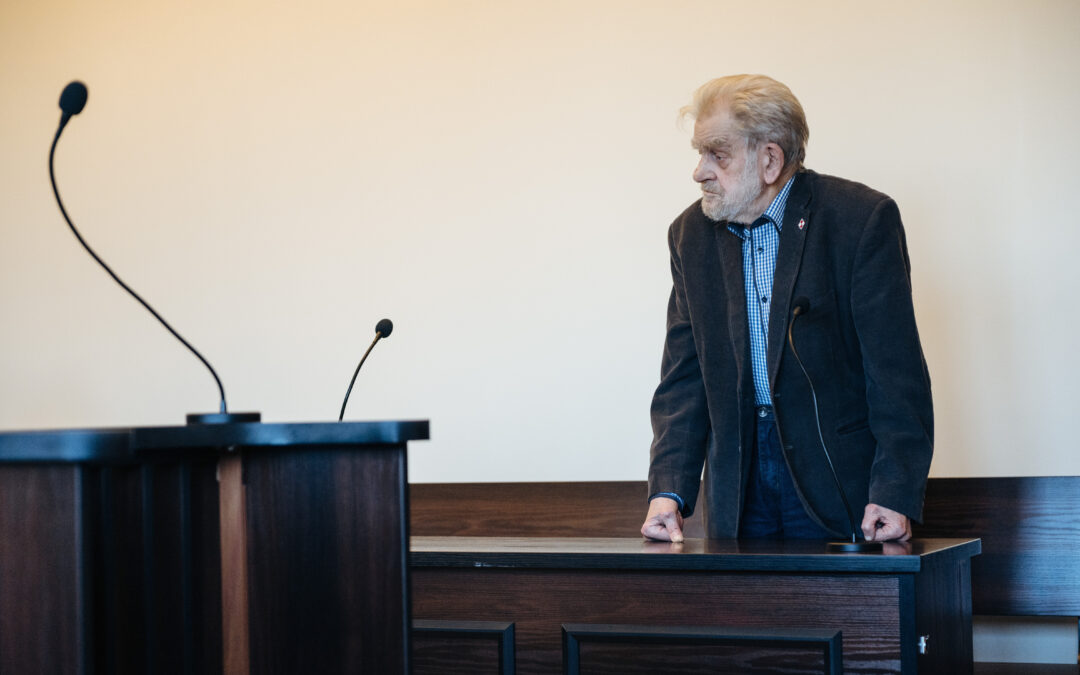A leading former dissident, Andrzej Gwiazda, has been awarded 425,000 zloty (€92,000) from the state as compensation for being interned by the communist authorities during martial law in the 1980s. The decision by an appeals court in Gdańsk upheld an earlier judgement by a district court.
Gwiazda’s attorney, Anna Bufnal, told media that the awarded compensation, which fell short of the 2 million zloty he had requested, was “fair” but that a larger figure could “even more fully compensate for the harm and suffering” during his 374 days of internment, reports RMF24.
Gwiazda, 86, was one of the founders of the Free Trade Unions (Wolne Związki Zawodowe Wybrzeża) association founded in 1978 as an alternative to state-subordinated trade unions. Soon after, he helped launch the Solidarity trade union and served as its vice president.
A prominent leader of the #Anticommunist opposition in🇵🇱 and one of those who set up #Solidarity, #AndrzejGwiazda was born #OTD 85 years ago. He was a member of the Presiding Committee of the Strike at #Gdansk's #LeninShipyard in August 1980 and co-authored its famous 21 demands. pic.twitter.com/R4l8sSBZ5O
— Institute of National Remembrance (@ipngovpl_eng) April 14, 2020
He had previously played an active part in the March 1968 and December 1970 strikes, and was a member of the committee of the August 1980 protests in the shipyard in Gdańsk.
He was interned on 13 December 1981 – the day that martial law was introduced in Poland – first in the Strzebielinek prison camp and later at a jail in the Warsaw district of Białołęka. He was released after an amnesty on 22 July 1984.
In December 1984, Gwiazda was arrested again following a scuffle with security forces and sentenced to five months in prison, which he served in Gdańsk and Zabrze until May 1985.
In an earlier verdict in July, a district court in Gdańsk awarded the dissident 400,000 zloty. Gwiazda appealed, calling for 2 million zloty compensation. Last week, the appeals court upheld the decision making the judgement final.
Presenting the verdict, judge Włodzimierz Brazewicz highlighted Gwiazda’s role during the strikes of September 1980, throughout martial law, and leading up to Poland’s first semi-free elections in June 1989. “The only thing the court can say in this aspect is that the highest respect is due,” said the judge.
Yet, while Gwiazda’s merits as an opposition activist are “beyond dispute”, said Brazewicz, the level of compensation remained contentious. “Regardless of the amount the court would award, it would probably never be adequate compensation for imprisonment,” the judge added.
Brazewicz, however, criticised an “unfortunate” statement by Gwiazda’s defence comparing his internment to the 18-year wrongful imprisonment of Tomasz Komenda, who earlier this year won 12.8 million zloty in compensation, the highest such payout ever granted in Poland.
A number of former dissidents have claimed compensation for internment during martial law based on a 1991 law. Over the past decade, some have reopened cases after the Supreme Court deemed an upper limit on claims of 25,000 zloty to be unconstitutional, leading to it being scrapped in 2011.
Jan Rokita – a former MP from the Civic Platform (PO) who was an active member of Solidarity’s academic branch – had in 2010 also received 25,000 zloty in compensation for half a year of internment. In May this year, he won 120,000 zloty, reports Wprost.
In an earlier judgement, Gwiazda had also been awarded the maximum of 25,000 zloty from the state. Previously, only those who had faced repression between 1944 and 1956 had been able to take legal action, but in 2007 the period was extended up to 1989.
Main image credit: Bartosz Banka / Agencja Gazeta

Maria Wilczek is deputy editor of Notes from Poland. She is a regular writer for The Times, The Economist and Al Jazeera English, and has also featured in Foreign Policy, Politico Europe, The Spectator and Gazeta Wyborcza.




















